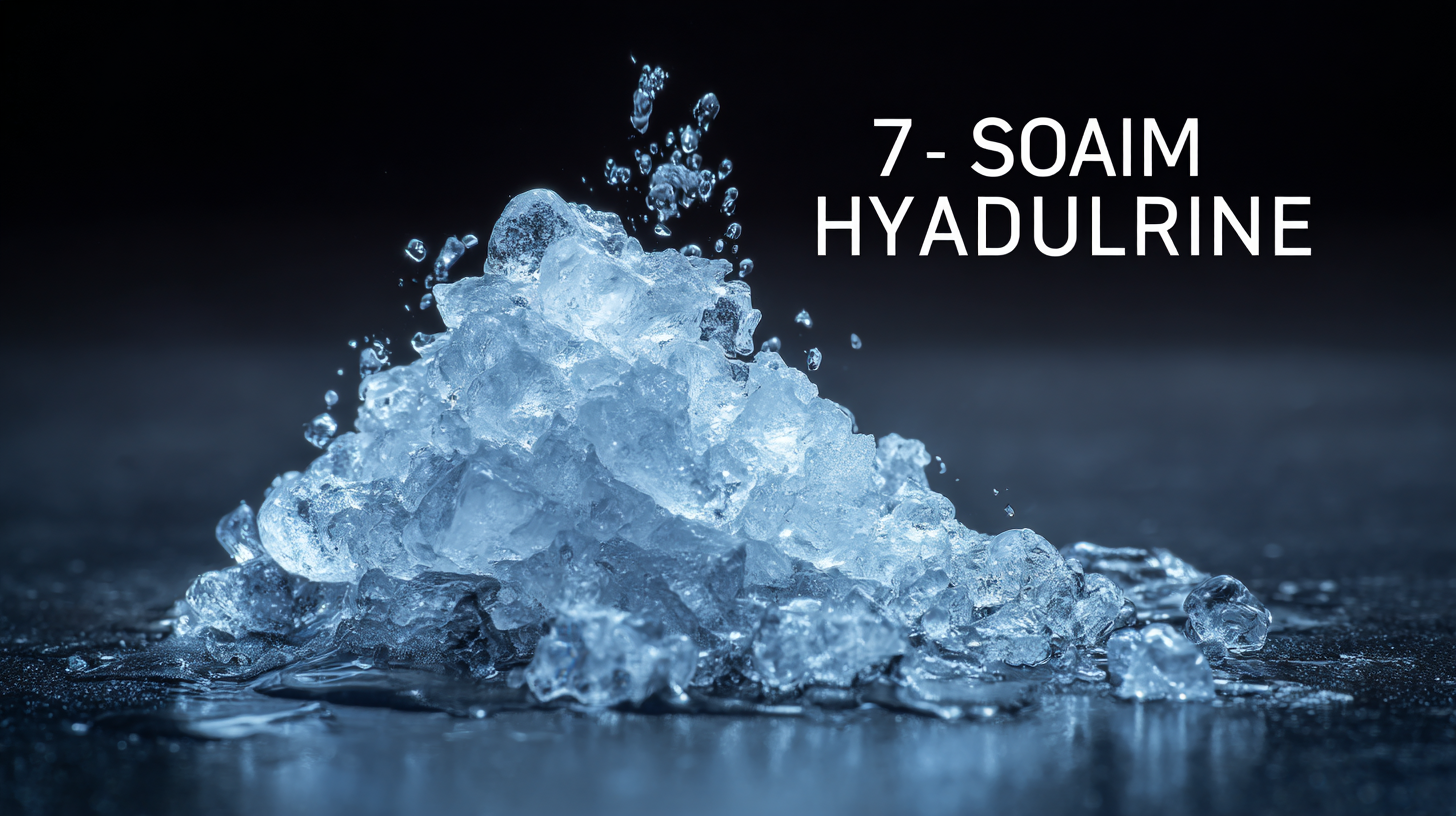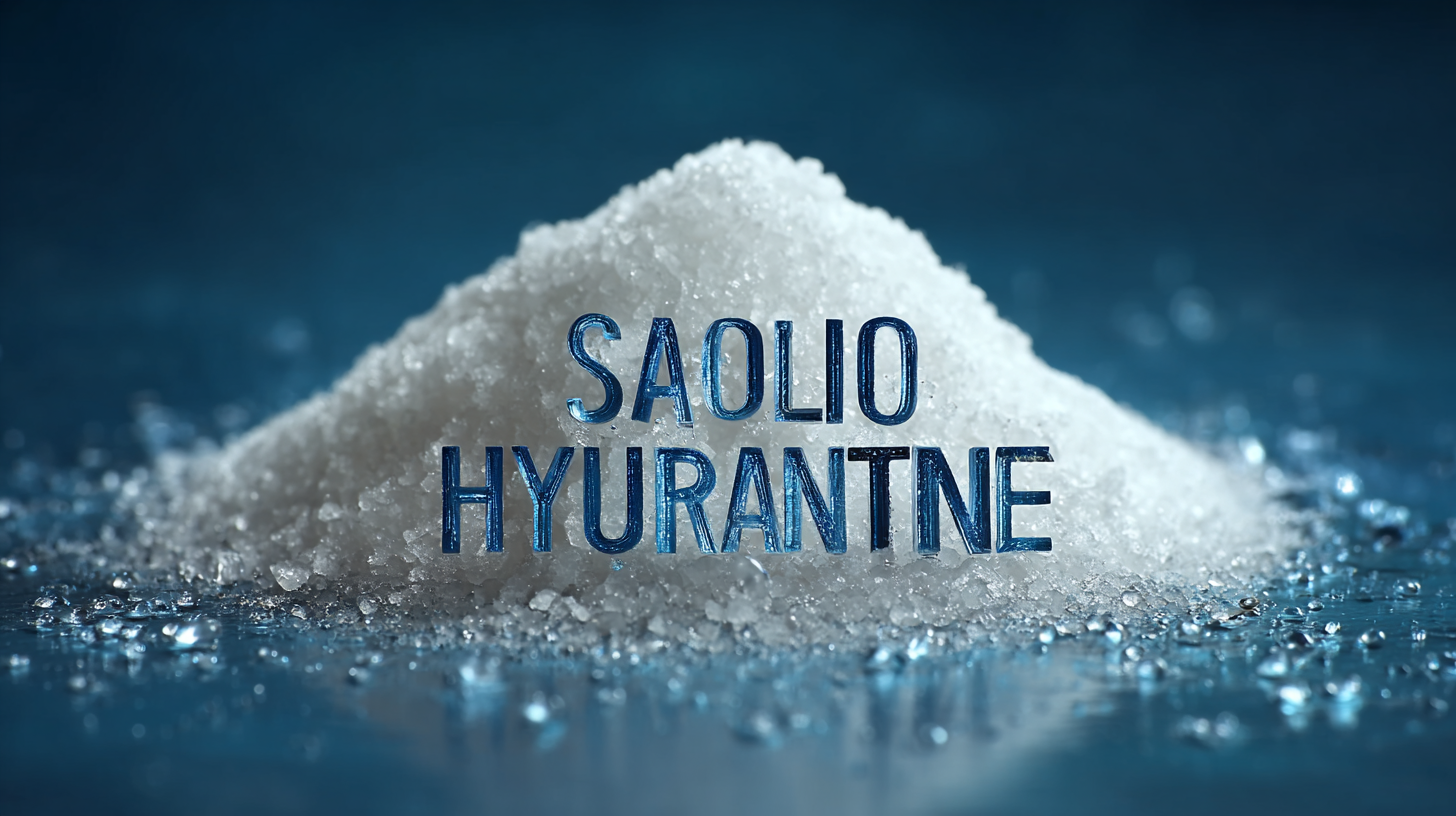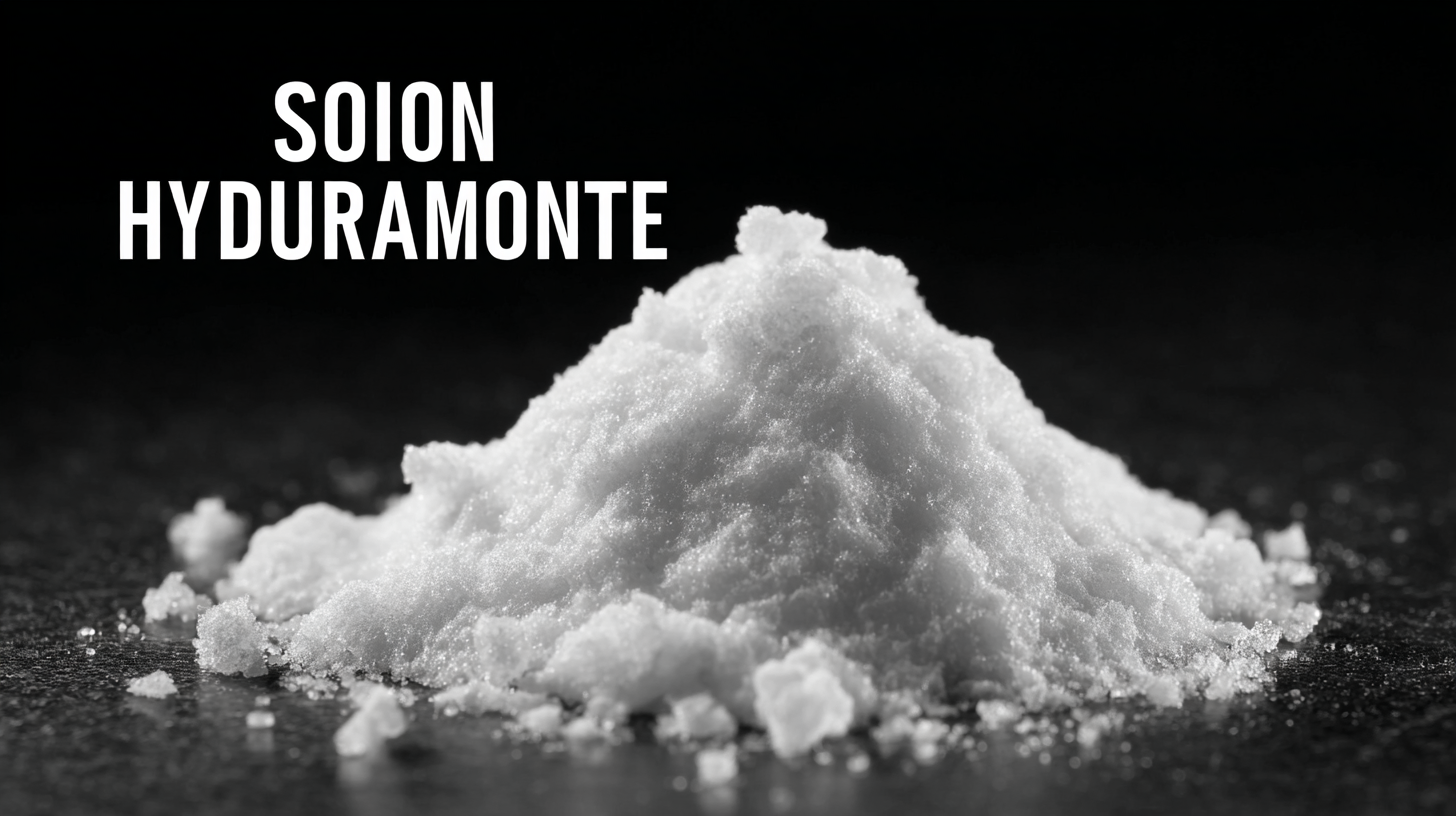
7 Incredible Benefits of Best Sodium Hyaluronate You Did Not Know
 Sodium Hyaluronate, a key ingredient in skincare and medical products, plays a crucial role in maintaining skin hydration and joint health. According to a report by Grand View Research, the global hyaluronic acid market was valued at over $10 billion in 2021 and is expected to expand at a compound annual growth rate (CAGR) of 6.3% from 2022 to 2030. This surge in interest can be attributed to its remarkable properties, including its ability to hold up to 1,000 times its weight in water, making it an unparalleled moisturizer. Additionally, studies published in the Journal of Dermatology highlight the anti-aging benefits of Sodium Hyaluronate, demonstrating its effectiveness in reducing wrinkles and improving skin elasticity. Despite its widespread use, many are unaware of the extensive benefits this powerful ingredient offers beyond just hydration. In this blog, we will explore seven incredible benefits of Sodium Hyaluronate that you may not have known, revolutionizing your approach to both skincare and overall wellness.
Sodium Hyaluronate, a key ingredient in skincare and medical products, plays a crucial role in maintaining skin hydration and joint health. According to a report by Grand View Research, the global hyaluronic acid market was valued at over $10 billion in 2021 and is expected to expand at a compound annual growth rate (CAGR) of 6.3% from 2022 to 2030. This surge in interest can be attributed to its remarkable properties, including its ability to hold up to 1,000 times its weight in water, making it an unparalleled moisturizer. Additionally, studies published in the Journal of Dermatology highlight the anti-aging benefits of Sodium Hyaluronate, demonstrating its effectiveness in reducing wrinkles and improving skin elasticity. Despite its widespread use, many are unaware of the extensive benefits this powerful ingredient offers beyond just hydration. In this blog, we will explore seven incredible benefits of Sodium Hyaluronate that you may not have known, revolutionizing your approach to both skincare and overall wellness.
Understanding Sodium Hyaluronate: A Technical Overview of Its Composition and Properties
Sodium hyaluronate, a derivative of hyaluronic acid, has garnered attention in the field of regenerative medicine due to its remarkable composition and properties. This polysaccharide is primarily found in connective tissues, skin, and cartilage, where it plays a crucial role in maintaining hydration and elasticity. Recent studies indicate that sodium hyaluronate's unique ability to retain moisture—up to 1000 times its weight—positions it as an essential component in various cosmetic and pharmaceutical formulations. For instance, its application in ocular products has showcased significant improvements in dry eye symptoms post-cataract surgery, highlighting its therapeutic potential.
Furthermore, the interaction between sodium hyaluronate and other biomaterials is a focal point in current research. In regenerative therapies, the composition and structural integrity of sodium hyaluronate can influence the properties of hydrogels used for periodontal therapy. As outlined in recent reviews, the strategic manipulation of these biomaterials allows for enhanced integration within biological environments, potentially leading to more effective healing mechanisms. The knowledge of sodium hyaluronate's properties as a bioactive compound underscores its increasing importance in developing advanced regenerative therapies and cosmetic applications that prioritize patient outcomes.
The Science Behind Sodium Hyaluronate: Molecular Weight and Its Impact on Efficacy
Sodium hyaluronate, a derivative of hyaluronic acid, plays a crucial role in skin health and hydration. Its molecular weight significantly affects its efficacy in various applications, from skincare formulations to injectable treatments. Studies have shown that low molecular weight sodium hyaluronate can penetrate deeper into the skin layers, providing intense hydration and stimulating collagen production. In contrast, high molecular weight forms predominantly work on the surface, effectively providing a protective barrier and reducing trans-epidermal water loss. This dual capability allows for tailored approaches in functional cosmetics, enhancing overall skin appearance and texture.
Tip: When selecting products containing sodium hyaluronate, consider your skin type and specific needs. For anti-aging effects, look for formulations with low molecular weight to ensure deeper penetration and collagen synthesis. Conversely, if you’re primarily seeking surface hydration, opt for products rich in high molecular weight sodium hyaluronate.
Research by the Journal of Clinical and Aesthetic Dermatology indicates that the optimal functioning of sodium hyaluronate hinges on its concentration and molecular weight. Generally, a concentration of 0.1% to 2% is recommended for topical applications, while injectables may require higher concentrations for effective volume restoration. For the best results, integrate products that combine varying molecular weights for a comprehensive hydration strategy, ensuring both immediate and long-lasting skin benefits.
Exploring Sodium Hyaluronate in Skincare: Key Benefits Supported by Clinical Studies
Sodium hyaluronate, a powerful derivative of hyaluronic acid, has gained significant attention in the skincare industry for its remarkable hydrating and anti-aging properties. Clinical studies have shown that this ingredient can retain up to 1,000 times its weight in water, making it an exceptional humectant. When applied topically, sodium hyaluronate penetrates deeply into the skin, providing instant hydration that leads to a plump and youthful complexion. Its ability to soothe and calm irritated skin also makes it an exemplary choice for individuals suffering from conditions like eczema or rosacea.

Beyond hydration, sodium hyaluronate boasts impressive anti-aging benefits supported by research. Studies indicate that it can promote collagen synthesis, which helps maintain the skin's elasticity and firmness. Additionally, it aids in reducing the appearance of fine lines and wrinkles, giving the skin a smoother texture. Its lightweight formula ensures that it can be seamlessly incorporated into any skincare regime, providing not just immediate benefits but also long-term improvements in skin health.
As more clinical research uncovers the potential of sodium hyaluronate, it solidifies its role as a skincare staple for those seeking luminous, youthful skin.
How to Choose the Right Sodium Hyaluronate Product: Formulations and Concentrations Explained
When selecting the right sodium hyaluronate product, understanding formulations and concentrations is crucial for maximizing its benefits. Sodium hyaluronate, a derivative of hyaluronic acid, is widely recognized for its ability to retain moisture—up to 1,000 times its weight in water—making it a staple in skincare and joint health products. A recent report from Transparency Market Research indicates that the global hyaluronic acid market is projected to reach $10.66 billion by 2025, highlighting the increasing demand for products that effectively utilize this powerful ingredient.
Formulations vary widely, so it's important to consider the intended use. For skincare, products with a low molecular weight are beneficial as they penetrate deeper into the skin, providing hydration at various levels. According to a study published in the Journal of Cosmetic Dermatology, such formulations can enhance skin elasticity and reduce the appearance of fine lines. Conversely, for joint health supplements, higher concentrations of sodium hyaluronate are often used, as they can work more effectively in lubricating joints and alleviating symptoms of osteoarthritis. By assessing these aspects, consumers can make informed choices that align with their specific needs and achieve optimal results.
Innovative Uses of Sodium Hyaluronate in Medicine: Beyond Skincare Applications
Sodium hyaluronate, a derivative of hyaluronic acid, is widely known for its skincare benefits, but its innovative applications extend far beyond beauty products. In the medical field, sodium hyaluronate plays a crucial role in treatments for various conditions. For example, it is commonly used in injectable therapies for joint pain, particularly in osteoarthritis. By acting as a lubricant and shock absorber, it helps to relieve discomfort and improve mobility for patients, making it an essential component in orthopedics.

Moreover, sodium hyaluronate has made significant strides in ophthalmology. It is utilized in eye surgeries, including cataract extraction and corneal transplants, to maintain moisture and stabilize the eye environment. The biocompatibility of sodium hyaluronate enhances patient comfort and promotes effective healing. Additionally, its capacity to facilitate drug delivery systems is being explored in various medical research areas, including wound healing and tissue engineering, showcasing its versatile nature in enhancing therapeutic outcomes. The ongoing exploration of sodium hyaluronate's potential in medicine reaffirms its position as a remarkable compound with benefits that reach far beyond its cosmetic reputation.
